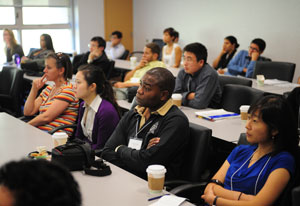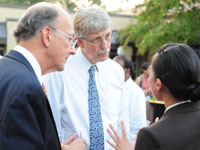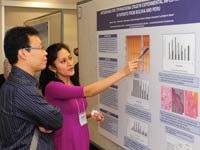Scholars, Fellows gather to share research findings
October 2010 | Volume 9, Issue 5

Photo courtesy of the Vanderbilt Institute for Global Health
Several hundred alumni of the Fogarty Clinical
Research Scholars and Fellows program gathered
to share research findings and experiences.
Several hundred alumni of the Fogarty International Clinical Research Scholars and Fellows program gathered near the NIH campus recently for their first-ever reunion and scientific symposium. The young scientists are engaged in a broad range of research from more traditional infectious disease projects to cardiology and cancer studies. Many are also investigating novel ways to apply emerging technologies to speed up discoveries.
The global health research community needs their ideas and enthusiasm, said NIH Director Dr. Francis S. Collins, who spoke at the event. He stressed the growing prominence of global health and expressed appreciation for "courageous people working against considerable odds."
Fogarty Director Dr. Roger I. Glass emphasized the youth and energy of the scholars and fellows, likening them to the NASA engineers who worked on the Apollo 11 mission in the 1960s. "The average age of people working on the first moon landing was 28 years old," he said.
Launched in 2003, the program provides a year of mentored clinical research training to pre-doctoral students at a foreign training site, pairing a U.S. trainee with a foreign researcher native to the site country. It has since funded the training of hundreds of U.S. and international researchers.
The initiative was expanded in 2007 to support Fellows, post-doctoral scientists and clinical investigators who are already conducting research in low-and middle-income countries. The Scholars and Fellows program is administered through a grant to Vanderbilt University.

Photo courtesy of the Vanderbilt
Institute for Global Health
Fogarty Director Dr. Roger I. Glass
and NIH Director Dr. Francis S.
Collins learn about one participant's
experience in the program.

Photo courtesy of the Vanderbilt
Institute for Global Health
Scientific presentations covered a
broad range of topics.
Throughout the gathering, the alums shared their stories from the field and discussed their research challenges and accomplishments. "The purpose of research is not to keep it secret, but to share it for the betterment of mankind," said Dr. Sten Vermund, director of Vanderbilt University's Institute for Global Health, who oversees the program's support center. He lauded the participants for having published more than 340 articles in peer-reviewed journals.
Mental health studied
One project presented at the conference examined attitudes and barriers among clinicians regarding depression in HIV/AIDS patients. Depression can be a disabling disorder in HIV/AIDS patients and, if untreated, can even influence progression of the disease.
Psychiatrist Dr. Samuel Likindikoki, a 2007 Scholar from Tanzania, discovered depression is often undetected in HIV/AIDS patients or poorly managed because of clinicians and the systems in which they work. His findings showed that more than 65 percent of the clinicians in the study felt that typical depressed patients exaggerate symptoms, while 30 percent viewed the diagnosis of depression as stigmatizing. The study also showed a higher knowledge of depression symptoms among female clinicians. Finally, a high percentage of clinicians in the study identified systemic barriers to addressing depression such as insufficient psychosocial training and time, inability of clinic systems to allow diagnosis and lack of clear policy and guidelines.
Participants develop new skills
Some participants use the program to develop new skills. Dr. Richard van Zyl-Smit, a 2009 Fellow and pulmonologist from South Africa, described how he used the time to develop the basic research skills required to pursue an academic career.
"The skills learned at the bench are very different from those learned during clinical training," he said. "I'm fortunate that I have had the opportunity to do this full time as it is usually not possible with financial and time demands."
The Fogarty Fellowship allowed him to cultivate these skills while conducting an innovative study examining the effect of cigarette smoke on immune responses to tuberculosis infections.
Using an apparatus he constructed from a pump and tubing, van Zyl-Smit extracted nicotine from cigarettes and exposed TB-infected macrophages to the extract to test their immune responses and aid him in confirming a causal relationship. He found that exposure to the nicotine extract greatly reduced the production of key cytokines used in the defense against TB during infection. The study is ongoing, but early findings suggest a potential mechanism explaining the link between smoking and risk of TB infection. As an estimated 15 percent of TB cases worldwide may be attributable to smoking, the study could significantly impact nicotine replacement strategies and ultimately influence policy regarding control of tobacco.
Employing new technologies for cancer screening
Mobile technology is being used to aid cervical cancer screening in Zambia, with assistance from former Fogarty Scholar Dr. Krista Pfaendler. In 2006-2007, Pfaendler worked at the Centre for Infectious Disease Research in Zambia, where she implemented a low-cost screening program. Cervical cancer is the deadliest form of cancer among African women and access to screening procedures in Zambia has traditionally been limited to the wealthy or overtly symptomatic. Pfaendler's approach was novel as it included the use of affordable consumer-grade digital cameras for cervical photography and visual inspection using acetic acid, or household vinegar.
Since Pfaendler and her colleagues began the screening program, over 50,000 women have been examined and more than 6,000 treated. The program has been gradually scaled up, with the establishment of 12 sites in the capital city of Lusaka alone. Nurses working under the program now employ a distance consultation system, taking digital photographs of cervixes and sending them via mobile devices to gynecologists for immediate consultation. Additionally, 19 physicians and 59 nurses from 10 African nations and China have been trained. The next step, says Pfaendler, is a system that will function offline during outages and send images once connectivity returns.
More Information
To view Adobe PDF files,
download current, free accessible plug-ins from Adobe's website.